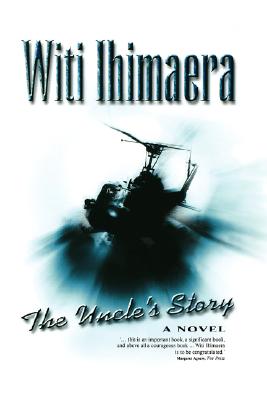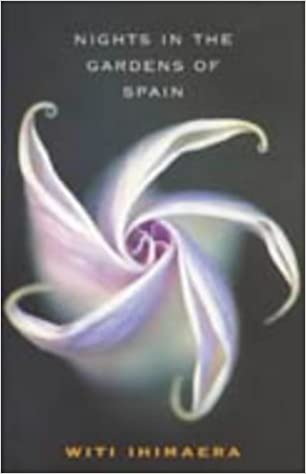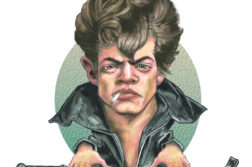 The Uncle’s Story
The Uncle’s Story
by Ihimaera Witi
Penguin Putnam (2000)
Univ. of Hawai’i Press (paper, 2002)
 Nights in the Gardens of Spain
Nights in the Gardens of Spain
by Witi Ihimaera
Reed Publishing (Auckland, New Zealand), 1995
WITI IHIMAERA was born in 1944, in Gisborne, New Zealand, into the Te Aitanga A Mahaki, Rongowhakaata, and Ngati Porou tribes. The New Zealand writer and poet Bill Manhire once noted that if Moby Dick were translated into the Maori language, its introduction would be titled “Call me Ihimaera.” The Ihimaera is a Maori version of the name Ishmael. His nickname is “Wicked” Ihimaera.
Ihimaera emerged as a writer in the 1970’s, a time of Maori renaissance in the arts. In 1972 he published his first book, Pounamu, Pounamu, a collection of short stories. New Zealand Prime Minister Norman Kirk read the book and selected Ihimaera to serve in the Ministry of Foreign Affairs. As a diplomat Ihimaera served in Canberra, New York, and Washington. In his acknowledgments to The Uncle’s Story (2000), he remembers the grief surrounding the unveiling of the AIDS Quilt in Washington in 1997. His second book, Tangi (1973), which tenderly portrays a boy who learns about his father’s death, is considered the first novel written by a Maori writer. Currently Ihimaera is teaching in Auckland and has compiled and edited a number of anthologies, one of which is called Growing up Maori (1998).
With his curious mind and restless feet, Ihimaera is still surprised by his achievements, by his transition from a suburban youth into a famous writer. In a personal letter to me, he remarked that “it was Richard Ford who emphasized that passion is worth more than form or style in writing. I like to think that, if anything, people might remember my work for its passion and subversive energy.” Of his two gay books, Ihimaera prefers Nights in the Gardens of Spain (1995) to The Uncle’s Story. In 2002 a movie based on Ihimaera’s novel Whale Rider (1988) was screened in New Zealand and later will be shown at the Toronto Film Festival. Witi Ihimaera considers English to be his primary language for articulating his visions of Maori identity. In an interview with Paul Sharrad he said that the Maori language is “sacred” for him, and that English is a “profane” language. He also notes that if his works were written in Maori, they would not reach as wide an audience. What’s more, he stresses, Maori is a warrior culture and a homophobic one at that, and does not always have special terms for the ideas he wishes to express. I FIRST heard about Witi Ihimaera from Brian Boyd, widely regarded as one of the world’s leading authorities on Vladimir Nabokov. Ihimaera and Boyd are both professors at the University of Auckland in New Zealand; Boyd has characterized his colleague as “the leading male Maori novelist.” If, as structural anthropologist Lévi-Strauss maintained, we understand the world through bipolar opposites, Ihimaera’s work is intensely involved in the exploration of such polarities: aboriginals versus newcomers; homo- versus heterosexual relationships; Maori versus “Pakeha” or white New Zealanders. Each has a strongly personal dimension for Ihimaera, who struggles in both his life and his work with the opposition between tradition and modernity, with “the dilemma of being Maori in a postmodern world.” His latest work, a play entitled Woman Far Walking, in which a 161-year-old heroine (!) is born on the day in history on which a treaty was signed between Pakeha and Maori over land ownership, is devoted to this edgy coexistence. A former diplomat, Ihimaera dwells on relationships, both political and private ones, in his two most recent novels, each of which has a strongly gay theme: 1995’s Nights in the Gardens of Spain and 2000’s The Uncle’s Story. Prior to writing Nights in the Gardens of Spain, which can probably be considered the first Maori gay novel, Ihimaera never touched upon a gay theme, so I can only assume that for readers accustomed to his more mainstream works depicting Maori myths or exploring Maori notions of masculinity and matriarchy, they came as something of a shock. At times the opposition between “gay” and “straight” becomes entangled with an opposition between “gay” and “Maori.” When in The Uncle’s Story Sam falls in love with Cliff, an American chopper pilot with whom he served in Vietnam, his father presents him with the stark choice of being either Maori or gay, declaring that the two are incompatible. A lesbian Maori activist, Roimata, remarks that the central character in this book, Michael Mahana, has been “colonized twice over,” once as a Maori in the context of a Pakeha-dominated society, and once as a gay man in a subculture that is itself controlled by white values and aesthetics: “[I]t is their images which tell you what is desirable, what you should be like and what you shouldn’t be like.” The theme of double condemnation is echoed by one of the characters in Nights in the Gardens of Spain, who observes: “It is bad enough to be gay in this cultural milieu, but it is doubly disempowering to have a white lover of either sex.” Here the opposition between being Maori and being gay is explained by a Maori activist: To be gay instead of “the iwi” is to be selfish. Somebody needs to carry on the family lineage, “as proudly as a flagpole.” To shirk this duty is to disregard the priorities of the tribe. The title of Nights in the Gardens of Spain comes from the title of a musical work by the Spanish composer Manuel de Falla. (A Maori by birth, Witi Ihimaera is somewhat European in spirit. Awarded the Katherine Mansfield Fellowship, he lived for a year in Menton, France. A devotee of Western classical music, he wrote the libretto for an opera, Galileo, that premiered last summer in England.) The novel’s hero and narrator David, a university professor in a film studies department, is open to Western culture and introduces his students to Shakespeare, Orson Welles, and Roman Polanski. He teaches them various versions of Macbeth: the play by Shakespeare; the film noir movie Joe MacBeth by Ken Hughes; and the movie by Welles. Here he seems to be underscoring the very Maori notion that a story can be told in a number of different ways. While Ihimaera insists that Nights is not completely autobiographical, both he and his hero David have two daughters. David is married to a woman named Annabelle, who possesses “intelligence, beauty, strength and passion.” Despite her faithfulness, however, David leads a double life and intends to leave her. One chapter is called “One’s Real Life is Often the Life One does not Lead.” During the day David shares household chores with his wife, teaches, and takes care of nine-year-old Miranda and seven-year-old Becca; at night he frequents saunas and gay bars. In the morning, he stares at his face in the mirror and sees two people there. Will he be able to consolidate them? Steamy scenes in the showers alternate with a happy domestic life, creating a sharp, sometimes painful, contrast. David’s father says that homosexuality is a weakness, but David shows that he’s capable of great strength. He contemplates the convenience of entering into a straight marriage versus the consequences of establishing a same-sex union without tribal approval, based solely on a free choice. A chapter called “The Steam Parlour” offers a commentary on the ethnic variety of men: “Blacks are generally bigger. Orientals are surprising sexual gymnasts. Scotsmen are to be savoured. Poles smell of hay. Dutchmen are collector’s items. Englishmen are apologetic until coaxed out. Americans are gorgeous and come with tans. Polynesians, by virtue of their sensual natures, are the best.” If being gay casts any doubt on one’s manliness, David seems determined to prove his masculinity by the sheer quantity of lovers he pursues, as if the more men you sample, the more of a man you are yourself. And yet, he also wants to find a suitable man with whom to settle down. Back on the home front, when he finally reveals his homosexuality to Annabelle, she can’t believe him and vomits violently. When he gives his daughter a glass of milk, Annabelle is afraid that he could pass AIDS on to their children. Ihimaera’s writing, to use a Nabokovian image, may be described as having muscles: as well-toned and athletic. Every joint of his flexible prose moves smoothly and purposefully. Nights in the Gardens of Spain is really about family nightmares and the decisions one needs to make to live on one’s own terms. The gallery of female protagonists includes the protagonist’s unsuspecting daughters, a wife disgusted by her husband’s homosexuality, and the hero’s mother, who at one point exclaims that she wishes she’d never brought him to the world. (Again, this attitude is caused mostly by fears about the family lineage ending. A character in The Uncle’s Story, the Noble Savage, states that his mother cannot stop grieving after her realization that “the whakapapa”—genealogy—would cease after her son.) Some provocative moments of the book were apparently omitted: a note at the end of the book mentions that “the original, more explicit and ruthless version of Nights in the Gardens of Spain” can be accessed in the author’s archive only with special permission. This need to sanitize the original version certainly gives one pause. Still, even the published version gives us an idea of how raw and rough a closeted gay life in New Zealand can be: There are three places in this city where I like to find sex after midnight. The first is Steam Parlour. The second is The Fuck Palace. The third is the Maze. Around this threesome there are the other establishments. The bars with their members-only Jack Off clubs. The X-rated gay cinema in the sleazy downtown area by the dock. Handcuffs (the S&M bar), Cowboys (the leather bar), the Powder Puff (the transvestite bar), Fa’a-afine (the Polynesian bar), The Tool Room, the two lesbian bars and the gay pubs. Ihimaera has a way of painting small, touching episodes against the backdrop of large political events. One example is the story of John Johns or “Choirboy” at Saint Crispin’s, a boarding school, when he’s assaulted by the other boys after letting everyone know that he’s homosexual. Choirboy is pushed into a urinal and beaten up. David, at that time a teenager, rescues him. “In New York in the late 1960’s, a group of transsexuals and transvestites threw bricks at Stonewall Inn and, with that act, Gay Liberation was born. Choirboy was like that for me. When he was assaulted for being what he was, he became all that Stonewall represented. He did not hide what he was, as I did. He was the bravest of us all.” Toward the end of the book, we learn that another character, Jack, has committed suicide because his lover Warrick was out tricking too much. David learns that Jack was actually Choirboy from Saint Crispin’s. Such is the way in which the past can come back to haunt the present in the life of David. In The Uncle’s Story, a novel devoted to “all the Sams and Cliffs of the world,” Ihimaera invites us to compare the love between Cliff and Sam to that of Tristan and Isolde. The frontispiece offers an epigraph from Wagner’s “Brangane’s Warning” and informs us that the book’s working title was The Brangane’s Warning. The story is about a young, gay Maori man named Michael Mahana, disowned by his family for announcing, right before his sister’s wedding, that he is homosexual. Michael discovers the secret of his late Uncle Sam, who was drafted and shipped off to Vietnam. Sam was also disowned by his father, a tough Maori warrior, for having brought back from Vietnam the blond, handsome Cliff Harper, a.k.a. “Woody Woodpecker,” an American chopper pilot. It was amid the atmosphere of battles, brothels, bars, and booze that Sam—almost without knowing it, mistaking his feelings for male camaraderie—fell in love with Cliff. Sam had given Cliff Harper a family treasure, a little amulet called a “hei tiki,” a figurine of a man (Tunui a te Ika) that Maori men pass from one generation to the next for protection. Noticing this gift, Sam’s father Arapeta understands everything in one hair-raising instant and goes completely berserk. Michael Mahana learns about Sam from his Aunt Pat, a pathetic spinster who, while a teenage girl, was infatuated with her brother’s lover. Michael himself is involved in the activities of the gay and lesbian Maori community and has a lesbian friend Roimata, the CEO of Toi Maori, an indigenous arts organization. While trying to find out the truth about this uncle who was erased from family history—his page torn from the family Bible, his body buried in unconsecrated ground—Michael Mahana is led to sort out some issues with his boyfriend Jason. Indeed Michael and Jason decide to split up, thanks in part to Jason’s therapist. There are some moments in the book that are hard to believe, at least within a modern Western context. Arapeta whips his grown-up son, a soldier who survived deadly warfare in Vietnam, for disobeying by “not repenting his sin,” and adds to Sam’s humiliation by urinating on him, proclaiming that he’s no longer his son “or a man”! Several times in both novels, Ihimaera uses the term “gay tribe.” He doesn’t elaborate at length, but does see a connection between a hypothetical “gay tribe” in relation to Maori society and the latter in relation to white society. At one point the colorful Roimata urges: “Don’t you understand, Michael? The issues of identity and space—of sovereignty, of tino rangatiratanga—that our people have been fighting for within Pakeha society are the same issues for gay Maori within Pakeha gay society! That gay tribe that your Auntie Pat asked about won’t just happen—it will have to be created, God dammit.” Roimata pictures a “tribe” based closely on the Maori model, founded not only on the homosexual orientation of its members but on family ties, as well. The tribe would have to have children and heirs. If the children born from these unions turned out not to be gay, they would still be considered as belonging to the gay tribe. Margaret Meklin, a native of St. Petersburg, Russia, living in San Francisco, will bring out a collection of short stories (in Russian) in 2003.




